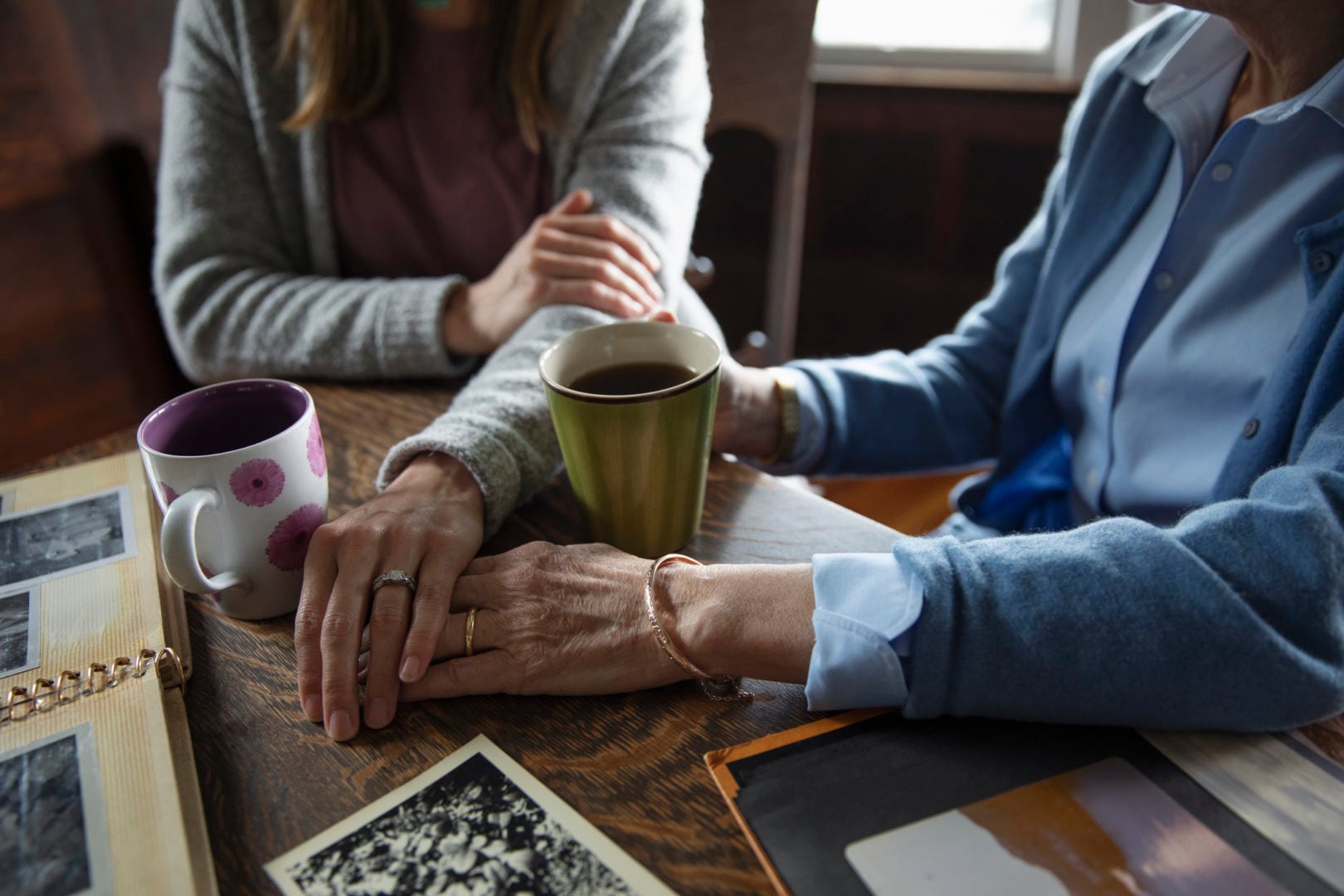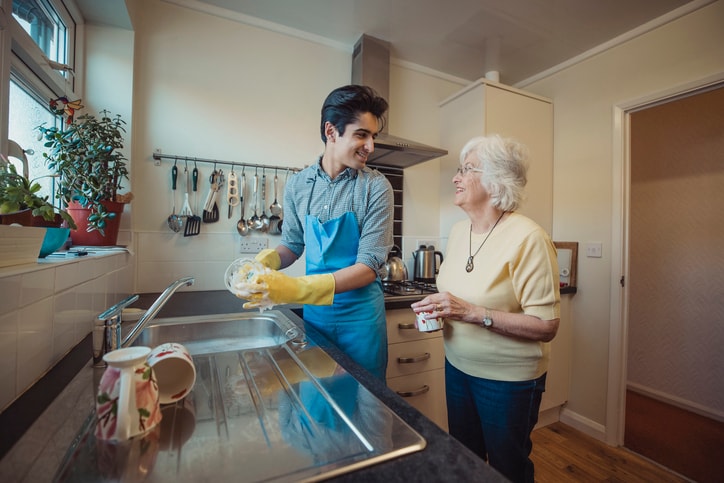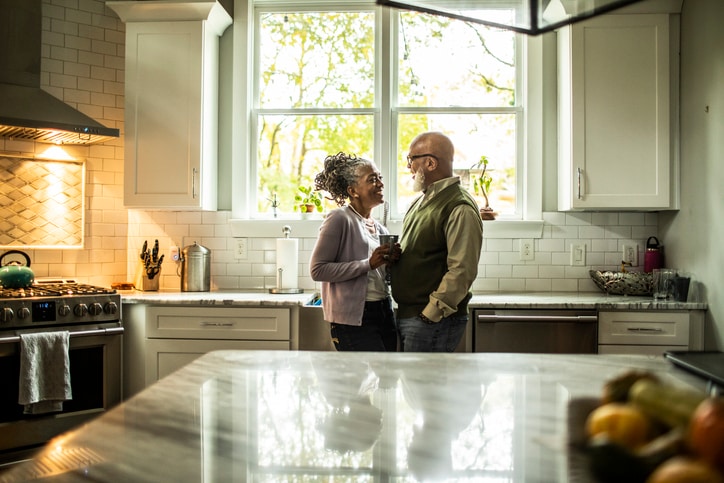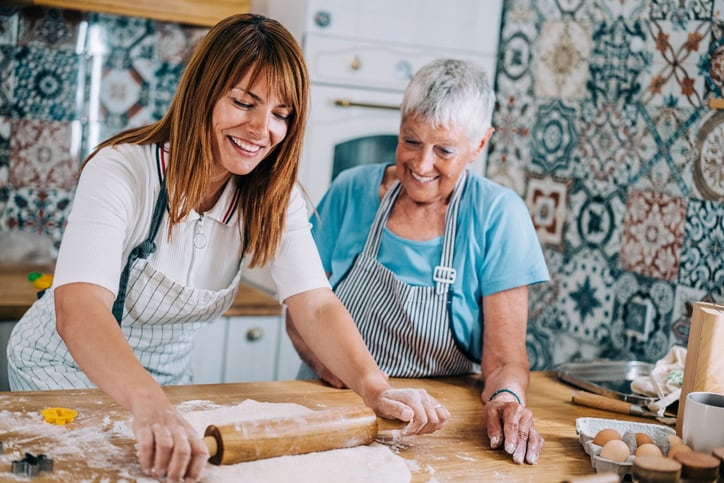Caught between my dying mother and my teenaged son, I felt as if I couldn’t do anything right. Or could I?
It was not the best of days. I’d driven home from the airport, exhausted, and had just sunk down into my couch, when my 17-year-old son banged down the stairs to tell me he wouldn’t go to school, marijuana musk seeping from his jacket. I did not respond to him, letting him slam his way out of the house. Instead, I checked the charge on my phone, so as not to miss an emergency call about my mother if I received one. At the same time, I prayed my phone would not ring.
My mother was in the end stages of Alzheimer’s disease. She lived on the opposite coast, and she was dying. During what turned out to be the last five weeks of her life, my brother and I took turns flying out to New Jersey. Once there, along with my father, we sat in her hospital room, where my mother would often become paranoid and abusive, scratching and hitting her caretakers in between bouts of moaning. With her family she lashed out verbally, saying things like “You’re useless if you can’t get me out of here,” and then, “You want me to die.” Still, we’d persist in sitting with her until she became too difficult to be with, then we’d walk out the door as she cried for us to come back. When we returned, she grew angry again.
I’d like to blame the dementia, but the truth is, my mother was the person she always had been, only now she was boiled down to her raw core, stripped of everything but her old angers and jealousies. She accused my father of sleeping with our home aide, and told me, as she lay strapped to her hospital bed, that I was a terrible daughter.
What do you do when your presence is demanded yet, somehow, you are not wanted, or even able to be helpful? I showed up, but I could not make my mother’s hospital time less excruciating. With her blistered memory, she had no idea why she was there—why she had to spend weeks strapped to a hard bed. The straps kept her from trying to get up and walk out, which would have meant falling. She’d forgotten that she couldn’t walk. Nor could I make adolescence any easier for my boy. On top of the raging moods, the self-consciousness of that age, he had a mom who seemed to be putting someone else before him.
I was 58 then—past young, faced with caring for parents and a teen, all of my charges swaddled in the obliviousness of their respective ages. I kept doing what I was doing because I knew it was what I should do, and I’d feel terrible about myself if I stopped. And yet my actions felt futile.
I had gone above and beyond, and sacrificed any sense of self I might have had in the process. And none of it helped, or so it seemed.
I tried to do my best for my mother, and for my father, who needed me. He was in his late eighties, and came to this caretaking business out of a very traditional marriage, one in which he knew so little about cooking that once, when my mother was away, he shoved a TV dinner into a hot oven, box, plastic, and all. His housekeeping skills hadn’t improved much over the years. When I visited, in the three or four years before my mother reached the end, I made meals for my dad to freeze and helped my mother wash and dress. I cooked foods both fattening and nourishing like iced carrot cake and chicken and dumplings. She didn’t want to eat, and her weight had plummeted to a dangerous low.
Early in her Alzheimer’s, my mother had gone from withdrawn and critical to mellow, eating my food with real appreciation, saying perkily, “I’ll hire the cook!” over and over. I showed her photos of my garden, with its tall lilacs and starry-bloomed apple trees. No matter how many times she saw the same pictures, she — always a plant lover — sat rapt. As she changed at the end of her life, my son, too, morphed. As a child, he was rambunctious, funny and sweet. He drew picture after picture of the two of us holding hands, round hands with ray-like fingers. Now he avoided touch, hurled his own accusations that I kept him a baby, or, if I asked him to do something, that I wanted too much. I think part of his rebellion was due to my distraction over my mother. He acted out to pull me back to him, to keep us close, the way we’d been.
When my son was small, I cut my work hours to part-time to be with him, making sure every day included one fun thing, whether it was the Children’s Museum or a trip to the beach. Then, Jin became the Angry Teen, getting suspended for bringing pot brownies to school. I tried to cure him with love, hugging him constantly, listening to him whenever he wanted to talk, luring him back into the family circle with food he craved, outings together, and movies. Sometimes it worked, and we could tease and laugh again. Sometimes his laughter dissolved into a glare, an abrupt “I’m leaving now.”
“Why do you keep going to your mom’s? Why keep doing things for Jin?” A friend asked me then. I said, “Because I can’t think of anything else to do.”
I had done all the right things, in other words, for these two people in my life, a boy and a woman who were hurting within themselves and, unwittingly, hurting others. I had gone above and beyond, and sacrificed any sense of self I might have had in the process. And none of it helped, or so it seemed. Both my mother and my son kept ticking off all of the ways in which I’d disappointed them: “Why can’t you take me home?!” my mother would snarl. Or, “Why can’t I drop out of school?” from my son. Meanwhile, I kept flying, between my mother’s anger on one coast and my son’s on the other.
You imagine that these gestures matter, that your love matters, even if only as a dim light in someone else’s darkness. I believed my mother would remember me being at her bedside, perhaps in a final moment of clarity.
I had fantasies, then, of escaping my life, of grabbing my wonderful husband Bruce, who was doing as much as he could in all this, and fleeing across the very close border into Canada. I wanted to stop putting all of my emotional energy into relationships that weren’t thriving. I had no sense of having my own life anymore, and I wanted that feeling back.
I also had plenty of needs of my own. I have bipolar disorder. I’m consistent about medication and had finally achieved a stable medical condition about 15 years before all this happened. But when my mother began dying and my son began acting out, I went days on end without sleeping. I swallowed anti-anxiety meds and hoped the strange, swimmy/confused/fearful way I felt didn’t show, especially when talking to my mother’s doctors. While visiting my mother in the hospital, I would slip away to the caretaker’s room to hold my head as colors and shapes and random words ricocheted around in there. My father, a hardscrabble guy from Brooklyn, fled to that room too, becoming obsessed with Keurig coffee and a bulky vibrating chair.
My mother died. My son grew to 18, left home for college, and learned that he liked me again. The year of my mother’s death is a painful one to remember. Here’s what I understood, though, by the end of it: Even if no one thanks you for doing the right thing, you thank yourself. If you have supportive people in your life, you ask them to notice what you do, and to tell you that you’ve done some good. You take days off, if you can.
You try to imagine that the gestures you make — for me, hugging my son though he yelled at me, or holding my mother’s hand — are somehow moving beyond the moment in which you make them. You imagine that these gestures matter, that your love matters, even if only as a dim light in someone else’s darkness. I believed my mother would remember me being at her bedside, perhaps in a final moment of clarity. At the hospital, I took time to speak to other patients who seemed to have no one to visit them. I tried to understand my giving of myself as holy in a way that has nothing to do with any particular faith. I tried to see giving myself as a way of opening up a space inside, one that would make room for a new kindness.
I also realized that I needed to distinguish between the care I gave to loved ones and what ultimately happened to those loved ones. Devoting all of your time to one person, lavishing your emotional capital on that person’s needs, leads to the feeling that his or her fate is somehow in your control. It is not. People who are ill will heal or not, children will make mistakes — and hopefully learn from them — but you can’t control any of it. And you need to live your life, acknowledging what you’re giving, and reserving some of that kindness for yourself.
And so, I read novels as I sat at my mother’s bedside, delicious immersive novels, mostly Dickens. My father and I made a point of scheduling meals at good restaurants, or making the comfort foods of my Italian-American childhood at home, piles of red sauce and ravioli after a day of hospital white. I didn’t think about it then, but these small things kept us aware that we each had lives to attend to, our own, and these, too, deserved care.
These days, my son, who loves film, calls to tell me he shot a video for a local rock group. He calls me, in other words, to let me know that something good happened, that he’s happy. At the end of the conversation, he says I love you. He’s not the child he was anymore, or the teenager, but someone new: almost 21, tied to me in a relationship I once held onto fiercely, even when it all seemed to be shredding away.
There are sometimes answers to the question of why we give and give and give, and sometimes there are no answers. And there are times when we need, for our own health and sanity, to refuse to sacrifice our own needs. I am stable again, sleeping, my meds reduced to normal. But true maturity means knowing, in a piercing way the young never will, how much we don’t know. It means knowing that time delivers results we never could have predicted, but are grateful for just the same.
By Suzanne Paola Antonetta
Suzanne Paola Antonetta’s Make Me a Mother, a Top Ten Book of the Year by Image Journal, was published by W.W. Norton in 2015. She is also the author of Curious Atoms: A History with Physics; Body Toxic, A Mind Apart; Stolen Moments, and four books of poetry. Her essays and poems have appeared in The New York Times, The Washington Post, Orion, The New Republic and many anthologies. She has taught in MFA programs in Vermont and Hong Kong, and also teaches at Western Washington University. She is the editor of the Bellingham Review.




